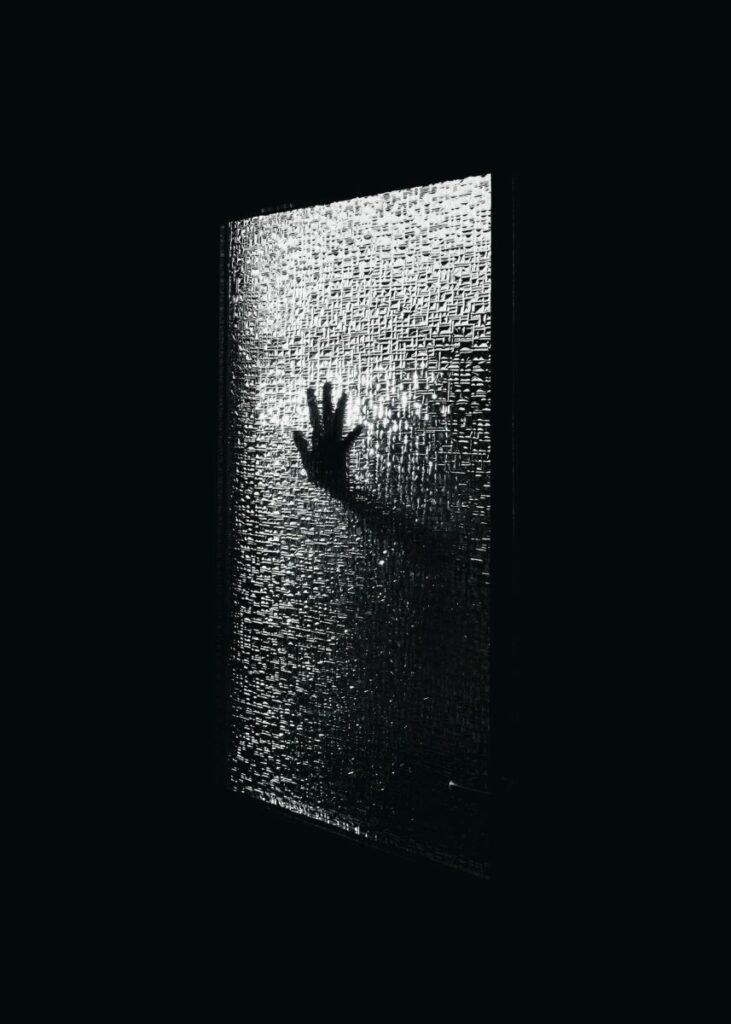
It’s hard to know when it started—the hollow feeling when I entered my building. The unease as I unlocked the front door, like I was entering a stranger’s house with my own key, the yellow porchlight turning my fingers into ownerless digits. Always I expected the weight to lift once I’d crossed the threshold, or certainly when I’d walked up two flights of stairs to my condo. But even inside my own space, it was still there.
Twenty-some years have passed since I lived on 19th Street in the Dupont Circle neighborhood of D.C., but I still think about my time there. In The Quiet American, Graham Greene wrote, “Wouldn’t we all do better not trying to understand, accepting the fact that no human being will ever understand another.” Theodore Dreiser warned, “The most futile thing in this world is any attempt, perhaps, at exact definition of character. All individuals are a bundle of contradictions.” Probably true, but I find myself ignoring their advice, still groping the bottom of a two-decade-old barrel, trying to figure it all out.
Built in 1917, my building housed twelve units, a handsome four-story brick structure with ornate white trim, large multipaned windows, and delicate Beaux Arts iron balconies that gave it a distinctly elegant, European feel. At first sight I fell in love with my place—600 square feet of hardwood floors flooded in natural light, a picturesque view of leafy T Street, proximity to the Spanish Steps and Meridian Hill Park, the exquisite menagerie of foreign embassies nearby. It was 2002, America was recovering and rebuilding from 9/11, and I too was beginning a new life. Starting a job, joining the ranks of national security employees, doing my part in the War on Terror. The condo was my first real-estate purchase, which felt monumental, a grand step, my entry into true adulthood. Towers of unpacked boxes cast delightful shadows across my freshly painted walls; the unknowns, the potential, filled every empty shelf.
Then came the small matter of my doormat. Only a few weeks into my new residency, neighbors began complaining: the mat got in their way; they tripped on it. A man called “Bud” who lived on the first floor was particularly opposed to the woven rag. It was far from the traffic flow, and I suspected people simply found the mat’s faded floral border unsightly. But I was a good neighbor, so I removed it.
A couple days later, I came home to an open door. Strange: I was sure I’d closed it. There were no telltale footprints, of course, because I’d removed my mat. Inside, my boxes were still unopened, stacked nearly to the ceiling, and I couldn’t tell if anything had been stolen. Panicked, I called the police. I wanted to—but couldn’t—tell them I was worried the break-in was related to my new job. You’ll be a target, my employer had insisted during orientation. From now on, you’ll need to be on your guard. A police officer came by, creeping around the door with handgun cocked. She found nothing. Maybe I’d left it open after all.
A renter, a guy named Tony, moved into one of the condos on the first floor. He was young and handsome, larger-than-life, ebullient, and talkative, the kind of guy who instantly became your best friend, who shared confidences and gossip like Tic Tacs. He said he’d moved to D.C. for a consulting firm or maybe it was a fashion house. Even then I had trouble remembering: as his lies stacked up, it would become harder to keep them straight. The building’s residents were mostly middle-aged and I was twenty-five, so Tony seemed a natural fit, someone to pal around with. One evening I asked if he wanted to join me for a Halloween party. Girl, definitely! He exclaimed. Come down and get me in five minutes. Decked out in my roller-girl costume, I skated up to his door, knocked. No answer. I knocked again, called his name. Still no answer. Bewildered, I left.
My job required long hours and I struggled to stay awake on my commutes. D.C. was in a heightened state of growth and revitalization, drawing young politico types by the droves, up-and-comers, aspirants, people eager to be insiders, segments of exclusive circles. On weekends I’d meet friends at bars and clubs in Adams Morgan—Toledo Lounge, Club Heaven and Hell, Madame’s Organ, The Angry Inch. We’d stay out until the middle of the night, then I’d return to my quiet, dark street that always felt a bit unwelcoming, for reasons I couldn’t fully understand—half-home, half-foreign.
Rats infested our building, entering through the exterior trash space, but that was no big deal; they’d infested every other building in D.C. Then, one morning, I woke up to a toilet that wouldn’t flush. Our building’s water had been shut off. (In the District, water is not shut off easily: months of nonpayment—with ample warning—are required before the city drops the axe.) Two women who lived together on the third floor were serving as the building’s treasurers, and they’d had been collecting—and pocketing—everyone’s monthly payments. In a weak gesture of penance, the treasurers booked a single room at the nearby “Hinckley Hilton” (nicknamed for Reagan’s would-be assassin), to be used on a rotating basis by all residents in our building. It was, predictably, constantly occupied, so for nearly a week I drove to my parents’ house in the suburbs to shower; I kept a ready supply of water bottles and flushed my toilet with liquid from a pail. Finally, the treasurers coughed up the money we’d entrusted to them and paid the water company. Greeting the embezzlers in the foyer following the incident was awkward—more awkward than my faded doormat had been.
Tony, whose murky job apparently never required him to come into work (this was well before the prevalence of telecommuting), began entertaining guests, mostly men, throughout the day. They would stay for short times—an hour or less—and never return. He withdrew, and I rarely saw him; my sole potential friend disappeared. I felt lonely. By that time, I’d been working for a while, but my job wasn’t as gratifying as I’d hoped or expected. It was taking a toll on me—the weight, the secrecy—and I couldn’t talk to anyone, couldn’t tell people I worked as an operations officer for the CIA.
America invaded Iraq in 2003, and a year later I volunteered to serve at the CIA station in Baghdad. Better me, I thought, than someone with a family back home. All I had waiting for me were two small rooms in Dupont Circle. So off I went to the Middle East for a year, futilely trying to help track down Al Qaeda leader Abu Musab al-Zarqawi, meeting informants in decrepit safehouses and armored vehicles, dodging mortars and rockets day and night, trying to sift truth from the mess.
It shook me up. When I got home, nothing seemed to fit. Everyday life turned menacing: a room full of sharp corners and exposed wires. I couldn’t readjust. Doors slamming and cars backfiring sent my heart racing. Panic electrified me when I got stuck in traffic and had no ready egress. I cried for no reason, and for every reason. My condo felt temporary, a staging ground for something, an in-between place.
My possessions accumulated as time went on, and the 600 square feet of space that had felt so roomy at first seemed to shrink; the place was cramped, sometimes triggered claustrophobia. The condo board decided to replace the carpet in the common areas and decorate the foyer with vases. Beautifying, they called it. Often, I’d watch T Street through my floor-to-ceiling window, enclosed by a wrought-iron balcony. It was just for show, the balcony, an illusion; you couldn’t stand on it. “By your window dreaming,” Theodore Dreiser wrote, “shall you long, alone.”
On weekends I would do laundry in the communal washing machine in the foyer. Dust from Baghdad clung to everything, even clothes I’d kept in my closet while gone. One Saturday I forgot about my load and, hours later, rushed downstairs to collect the wet garments before someone tossed them on the floor. But they were cycling contentedly in the dryer—coin-operated; somebody had not only tolerated my lapse but paid for it. A man I’d never seen before walked in and removed a few items from the washer. Cheerfully he admitted he was the good Samaritan—no trace of resentment or irritation at my delinquency. I asked where he lived. He indicated the first-floor condo across from the laundry room, just below my place. All those years, I hadn’t even known he was right beneath me.
The following week, our condo board called a meeting. There’d been a death in the building. The man who’d paid for my laundry, to whom I’d spoken only days earlier, had hanged himself. He’d lived alone and had been dead for several days, discovered only when the odor of decomposition permeated Bud’s condo next door. To my shame, I can’t remember the man’s name. But after he died, my condo felt different, the floor both quieter and more echoey, as though his underfoot absence affected the frequency and tonality of the sound waves. Sometimes, when I couldn’t sleep, I’d pace my living room, replaying his act of kindness before he took his life, wondering what shards of his past had finally lanced him, if there was something I could have said, why he’d been doing his laundry if he’d never need it.
Not long after the suicide, I came home one night to find the building’s front door open. In the four years I’d lived there, I’d been mugged and my car broken into four times. Plus, the ambiguous break-in. I didn’t want intruders, and I closed the front door. Bud, irate, stormed out of his place and reopened it. The stench of the dead body hadn’t gone away, he insisted, and he needed to air out the foyer. We continued to argue until our altercation became physical—Bud blocked me from closing the door—so I called the police, for the second time. An officer arrived. He knew Bud; they were friends. Who cares if the door remains open? The officer shrugged. I’d lost. I trudged upstairs and propped a chair beneath my doorknob. My unease had reached an apex, no longer tolerable. I didn’t trust anyone; I didn’t feel safe. I was uncomfortable in my own space, my own skin. I suppose everyone else was too—the one thing, I now see, we all had in common.
A few months before I moved out—to a bigger place in the suburbs with my own yard and my own locks—I came home to a courtyard littered with Tony’s belongings. He’d been evicted. Diane, the owner, confided he hadn’t paid the rent for months. Tony was nowhere to be found, and I never saw him again. But I still remember the images: a seventies-style couch, a broken lamp, a cheap suitcase, kitschy odds and ends, all scattered across the lawn, like a life turned inside out. Which I guess it was. The scene is frozen in dreamy strokes and rich colors in my mind, desperate and grim and strangely beautiful, like a Reginald Marsh painting.
Do the other residents still wonder about me the way I wonder about them? About what was behind my door, and whether I’d left it open that day, what they’d glimpsed inside. Whether I’ve moved on with my life. Because in my five years on 19th Street, Tony’s possessions, flung in kaleidoscopic disarray across the sun-parched grass, were all I ever saw of what lay behind those eleven other doors.


Share this post with your friends.

